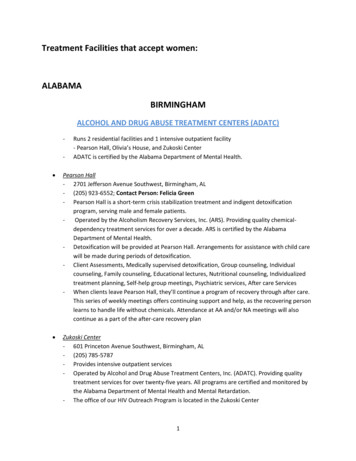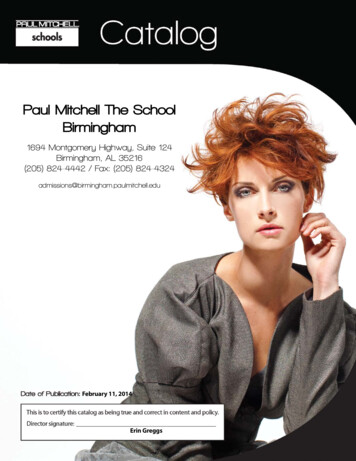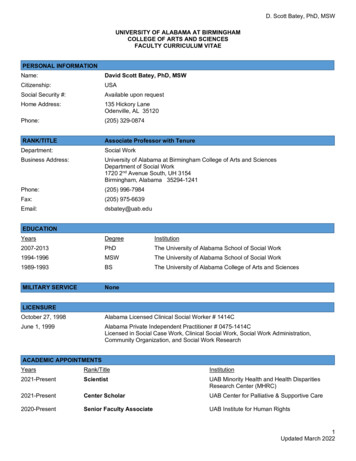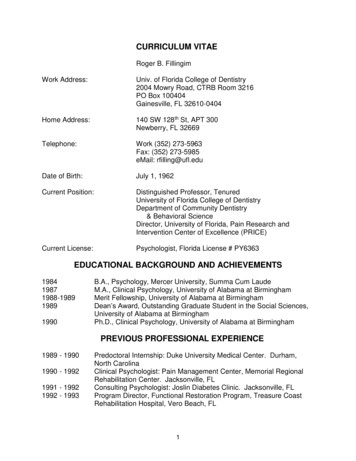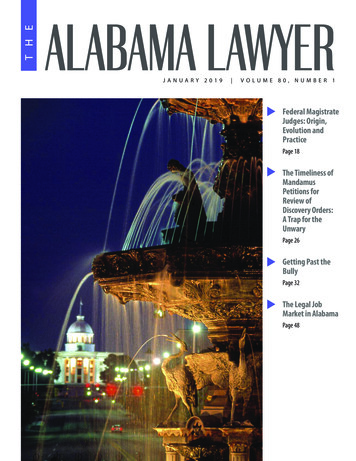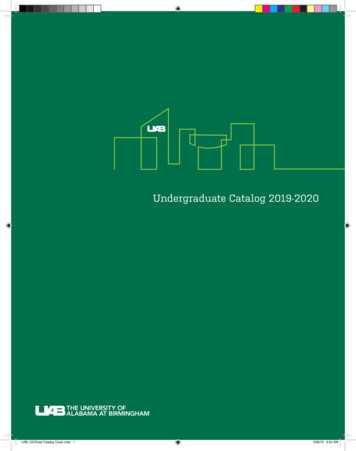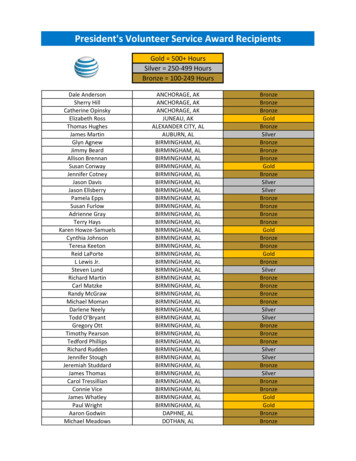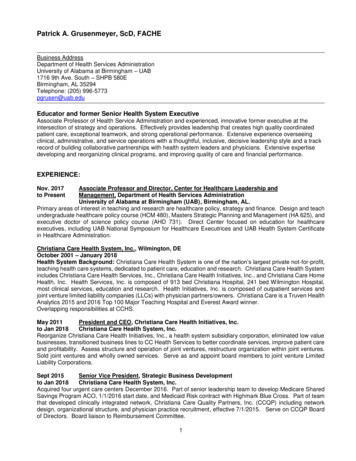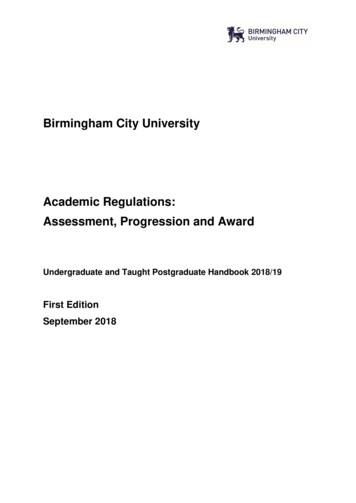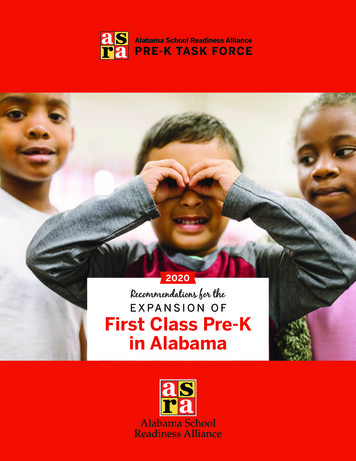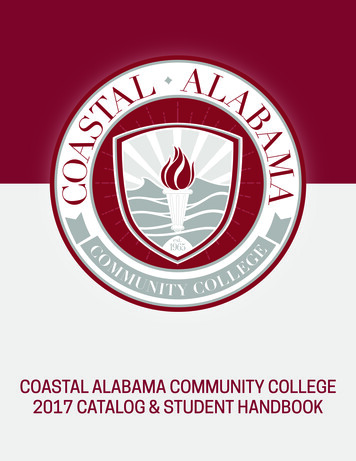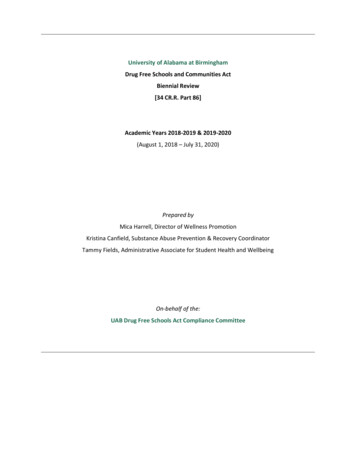
Transcription
University of Alabama at BirminghamDrug Free Schools and Communities ActBiennial Review[34 CR.R. Part 86]Academic Years 2018-2019 & 2019-2020(August 1, 2018 – July 31, 2020)Prepared byMica Harrell, Director of Wellness PromotionKristina Canfield, Substance Abuse Prevention & Recovery CoordinatorTammy Fields, Administrative Associate for Student Health and WellbeingOn-behalf of the:UAB Drug Free Schools Act Compliance Committee
IndexIIntroduction and Overview . 3IIPresident’s Approval . 4III Biennial Review Process. 5IV University Policy Review . 6VAnnual Drug-Free Campus and Workplace Policy Notification .9VI Policy Violation and Enforcement 10VII Services and Interventions. 11VIII Educational Programs and Initiatives . 13IX Status of Last Report Recommendations 24XNew Initiatives . 25XI Summary of Findings . 27XII Recommendations . 28XIII Conclusion. 28XIV Appendix . 292
I.Introduction and OverviewThe University of Alabama at Birmingham (UAB) is a comprehensive urban university with anationally recognized academic health center. Situated in Birmingham, the state’s largestmetropolitan area, UAB is the largest research university in the state of Alabama. UAB offers165 degree programs through 11 academic schools and colleges. There are 22,080 studentsenrolled during the Fall 2019 semester, up 0.72% from the Fall 2018 semester total of 21,923students.The Drug-Free Schools and Communities Act of 1989 (DFSCA) and the Department of EducationGeneral Administrative Regulations (EDGAR) Part 86 requires UAB to certify that it hasdeveloped and implemented a Drug and Alcohol Prevention Program (DAAPP) addressing theunlawful use, possession and distribution of alcohol and drugs within the UAB campuscommunity and its associated programs and activities. In addition to the establishment of theDAAPP, EDGAR Part 86 requires UAB to annually notify all students and employees of theprogram and biennially conduct a review of the program to determine its effectiveness andmake recommendations for its improvement. This report reflects the results of UAB’s biennialreview for the 2018/2019 and 2019/2020 academic years.3
II.President’s ApprovalAll members of the University community – including faculty, staff, and students have the right topursue their individual and collective goal in a healthy work and educational environment, one thatis free of the effects of alcohol and substance misuse. Such misuse adversely affects theUniversity’s achievement of its mission and is not condoned. The University addresses these issuesthrough a comprehensive program of education, prevention, and assistance programs andactivities, cumulatively identified as the UAB Drug and Alcohol Prevention Program.The 2018-2020 Biennial Review of the UAB Drug and Alcohol Prevention Program has beenreviewed and approved.Ray L. Watts, M.D.President4
III.Biennial Review ProcessUAB reconvened the Drug-Free Schools Act Compliance Committee in Fall 2020 to formallyreview the University’s efforts to comply with the Drug-Free Schools and Communities Act andconduct the biennial review. The findings and recommendations of this group are includedwithin this report.Members of the Drug-Free Schools Act Compliance Committee include:Mica Hughes-Harrell – Director, Wellness PromotionKristina Canfield – Substance Abuse Prevention & Recovery Coordinator, WellnessPromotion/Student Counseling ServicesTammy Fields – Administrative Associate, AVP Student Health & WellbeingTrevor Sutton – Assistant Director Residence Education, Student Housing and Residential LifeBrian Johnson – Director, Residence Life, Student Housing and Residential LifeJennifer Griffin – Director, Student Involvement, Student Involvement & LeadershipDaniel Carlson – Senior Associate Athletic Director, Athletics Department AdministrationJonathan Adams – Director, Student Conduct & OutreachJeffrey Alan Bates – Assistant Director, Student ConductCraig Decker – Director, Campus RecreationKelly Mayer – Director, Employee RelationsDr. Earlisha Williams – Executive Director, Employee RelationsMary Kathryn (Katie) Crenshaw – Chief Risk & Compliance Officer, Compliance & Risk AssuranceDr. Nicholas Van Wagoner – Associate Professor, MedicineDr. Ken Tilashalski – Professor & Associate Dean, School of DentistryKasey Robinson – Title IX Coordinator, Office of VP for Student AffairsConnie Wright – Program Manager II, Student Affairs, School of OptometryDr. Gerald Simon – Clinical Associate Professor & Director, Student Affairs, School of Optometry5
IV.University Policy ReviewThe committee completed an inventory and review of all relevant campus policies governingEDGAR Part 86 compliance. Policies that are available online have been embedded within thisreport.a. Drug-Free Campus and Workplace Policyi. Introduction1. The University of Alabama at Birmingham (UAB) is committed toproviding a healthy drug-free work and educational environment for allmembers of the UAB community, including faculty, staff, students, andvisitors. Alcohol abuse and illicit drug use endangers the health andsafety of employees, students and visitors. Such abuse adversely affectsand interferes with UAB's achievement of its mission, and it is notcondoned.ii. Scope1.This Drug-Free Campus and Workplace Policy applies to all members ofthe UAB community, including all students, faculty, and staff, as well asvisitors. It applies to behavior that occurs on the UAB campus, onproperty owned or controlled by UAB, and at UAB-sponsored orUniversity-supervised activities, including use and operation of UABsponsored vehicles. This policy works in conjunction with the UABStudent Conduct Code, HR Policy 634 - Alcohol and Drug Testing forReasonable Cause, and the General Policy Regarding the Use andConsumption of Alcoholic Beverages.2. Policy Statementa. Every UAB community member has a personal responsibility toadhere to all applicable laws and regulations, and policiesconcerning the use of alcohol or other drugs. These includefederal and state laws, city ordinances, the Student ConductCode, the UAB Enterprise Code of Conduct, and other UABpolicies.b. Alcohol and Drug Testing for Reasonable Cause – HR Policy 634This policy governs alcohol and drug testing of employees for reasonable cause.6
c. Board of Trustees Board Rule 303, Compliance with Drug-Free Workplace Requirements.Statement from the University of Alabama System Board of Trustees that charges theChancellor to ensure all University Presidents enact policies and procedures to ensurethat each campus will not fail to meet the requirements recited in the Drug-FreeWorkplace Act of 1988.d. General Policy Regarding the Use and Consumption of Alcoholic BeveragesWithin the academic and social environment of UAB, there are occasions where alcoholmay be served in a responsible manner within the campus community. To guide theoccasional use of alcoholic beverages, the University has established policies andguidelines governing the possession, sale, and consumption of alcoholic beverages onthe campus.e. Office of Student Conduct and Outreachi. Student Conduct CodeThe Student Conduct Code promotes honesty, integrity, accountability, rights,and responsibilities expected of students consistent with the core missions ofthe University of Alabama at Birmingham. This Code describes the standards ofbehavior for all students, and it outlines students’ rights, responsibilities, andthe campus processes for adjudicating alleged violations. All standards ofbehavior regarding alcohol and other drug use and campus processes foradjudicating violations of alcohol and other drug polices and standards areincluded within the Student Conduct Code.ii. Sanctioning Guide & GridThe Office of Student Conduct Sanctioning Guide has been developed to offergeneral sanctioning recommendations for violations of the Student ConductCode and to ensure a level of consistency among conduct officers and hearingboards when issuing sanctions.iii. Student Handbook (electronic handbook)The Student Handbook offers the University community information about anumber of resources, services, policies, and procedures.f.Housing and Residential Lifei. Residence Life Handbook7
The Residence Life Handbook provides information to residential studentoutlining policies and procedures including policies, expectations, andprocedures for alcohol and other drug use by residents and within theresidential halls. (please see appendices for excerpt)g. Student Involvement and Leadershipi. Fraternity and Sorority Life HandbookThe policies contained in this handbook review all expectations, requirements,and privileges of fraternities and sororities at the University of Alabama atBirmingham. In addition, all members and fraternal organizations must adhereto the rules and regulations outlined in the Student Code of Conduct. Includedwithin this handbook is a Statement on Alcohol and Other Drugs. (please seeappendices for excerpt)ii. Student Organization HandbookThe Student Organization Handbook serves as a resource for UAB studentleaders interested in developing, participating in, or leading a studentorganization. Information regarding hosting events with alcohol and eventmarketing guidelines are addressed within the handbook. (please seeappendices for excerpt)h. University Recreationi. The Club Sports Manual includes an Alcohol/Tobacco/Drugs Policy (please seeappendices for excerpt)ii. The Outdoor Pursuits program reviews a Drugs and Alcohol Policy with eachstudent group prior to the beginning of any trip and addresses that the StudentCode of Conduct applies to student behavior while on campus. (please seeappendices for excerpt)i.Athletic Departmenti. Student-Athlete Drug and Alcohol Education Program and Testing PolicyThis policy addresses overarching objectives for student-athlete alcohol anddrug education, drug-testing policy, process for violations of policies, andtreatment for substance abuse. (please see appendices for a copy of this policy)ii. NCAA Drug Testing ProgramThe UAB Athletic Department also adheres to the NCAA Drug Testing Program.8
V.Annual Drug-Free Campus and Workplace Policy (DFCWP) NotificationThe following describes UAB’s intentional efforts to notify the campus community of the Drugand Alcohol Prevention Program and relevant policies, standards of conduct, sanctions forviolation, federal, state, and local laws and campus policy as well as health risks associated withAOD use; and identification of treatment options.a. October 2018 – “Reaffirming UAB’s Commitment to a Drug-Free Workplace” emailed toall faculty, staff, students, and other employees at their official UAB email address. (seeappendices for a copy of this email)b. October 2018 – DFCWP notification published on the BlazerNet landing page for everystudent. Notification requires students to click they acknowledge that they have bothreceived and read the policy before navigating further into their BlazerNet account.c. November 2018 – DFCWP notification of published in the eReporter distributed to allstaff/faculty.d. January 2019 – DFCWP notification published in the eReporter distributed to allstaff/faculty.e. September 2019 – DFCWP notification published in the eReporter distributed to allstaff/faculty.f.September 2019 – DFCWP notification published in GreenMail distributed to allstudents.g. October 2019 – “Official Notice: UAB’s Drug-Free Campus and Workplace Policy”emailed to all faculty, staff, students, and other employees at their official UAB emailaddress. (see appendices for a copy of this email)h. October 2019 – “Official Notice: UAB’s Drug-Free Campus and Workplace Policy”emailed to all students at their official UAB email address. (see appendices for a copy ofthis email)i.October 2019 – DFCWP notification published on the BlazerNet landing page for everystudent. Notification requires students to click they acknowledge that they have bothreceived and read the policy before navigating further into their BlazerNet account.j.October 2019 – DFCWP notification published in GreenMail distributed to all students.k. January 2020 – DFCWP notification of updated Student Code of Conduct sent tostudents and published in GreenMail.9
l.June 2020 – DFCWP notification published on the BlazerNet landing page for everystudent. Notification requires students to click they acknowledge that they have bothreceived and read the policy before navigating further into their BlazerNet account.VI.Policy Violation and EnforcementCompliance with existing policies is essential to maintaining a healthy work and educationalenvironment, one that is free of the effects of alcohol and substance misuse. UAB will diligentlyenforce established policies and impose appropriate disciplinary sanctions on those who violatethem.a. Primary enforcement of University policies for students is through the application of theStudent Conduct Code administered by the Office of Student Conduct and Outreach.Anyone can make a report of a violation. However, most reports originate in campushousing through Residence Life. The UAB Police Department will also refer reports. TheStudent Conduct Code Sanctioning Guide and Grids inform the process.b. The following table outlines student conduct incidents:2018-20192019-202012Number of Charges114104Number of Responsible Findings475334Number of Charges5168Number of Responsible Findings2739Alcohol ViolationsDrug Violations1 Includes the following charge: Health and Safety – Use/possession of alcoholIncludes the following charges: b.1. Alcohol: Underage Possession/Consumption; b.5. Alcohol: Violation ofUniversity Policy; Health and Safety – Use/possession of alcohol3 Includes the following charge: Health and Safety – Use/possession of drugs4 Includes the following charges: g.1. Drugs: Possession/Consumption/Use; g.3. Drugs: Paraphernalia; Healthand Safety – Use/possession of drugs2c. Faculty and Staff policy violations are managed by the UAB Human Resourcesdepartment in compliance with established policy. Employee Relations addressed thefollowing AOD related issues for all campus and hospital employees.Employee Relations:Employee AOD Issues2018 - 20192019 - 202032 employees32 employees10
d. The UAB Police Department publishes the Annual Security and Fire Safety Report whichincludes criminal arrests and disciplinary actions for violations of liquor laws and drugabuse.Arrests for:2018201920182019On CampusCampus Housing*Liquor Law Violations0000Drug Abuse Violations152901Disciplinary Actions/Judicial Referrals for:2017201820162017On CampusCampus Housing*Liquor Law Violations1129311293Drug Abuse Violations27262726* Student Housing (Residential Facilities) are a subsection of On-Campus totalsVII.Services and InterventionsFaculty, staff, employees and students have information and access to a wide range of programsand services specifically targeted to meet those needs. The following identifies and describes arepresentative list of those efforts.a. Faculty and Staffi. Employee Assistance and Counseling Center (EACC) offers confidential supportservices for UAB employees and members of their immediate household. Adedicated team of certified counselors, an extensive collection of onlineresources and a schedule of programs and events are designed to help youidentify, understand and resolve work-related and personal issues including, butnot limited to, alcohol and drug abuse.ii. UAB Medicine Addiction Recovery ProgramAn addiction recovery program offered by UAB Medicine offers an individualizedapproach to the assessment and treatment of alcohol and substance abuse. Theprogram accepts most major insurances, including insurance programs offeredthrough UAB.b. Studentsi. AOD Prevention and Education Resources & Interventions1. AlcoholEdu11
Beginning in 2018, all new students are required to participate inAlcoholEdu from EVERFI. AlcoholEdu is a research-based onlineinteractive alcohol prevention education program designed to promotehealthy choices regarding alcohol use, including supporting non-use ofalcohol. The educational modules provide tailored information based onparticipant responses, incorporate campus AOD policies, and linkstudents with relevant campus resources.2. Alcohol & Marijuana eCheckUpToGoAlcohol & Marijuana eCheckUpToGo is free and available to all UABstudents and is a brief self-assessment that provides accurate anddetailed information about a student’s personal risk patterns, level ofalcohol tolerance, unique family risk factors, harm reduction strategies,and helpful resources.3. TAOTherapy Assistance Online (TAO) is free and available to all UABstudents. TAO therapy is an online platform of tools and educationalmaterials to help students learn about and change how they think andfeel. TAO is evidence-based and has been found effective in thetreatment of depression, anxiety, and other mental health concerns. Italso includes modules on evaluating alcohol and drug misuse as well asa module on supporting recovery skills.4. Student Counseling ServicesStudent Counseling Services offers many services related to alcohol,tobacco and other drug prevention and intervention. StudentCounseling Services provides screening, initial assessment,psychoeducation, brief intervention and referral services to students.5. Wellness PromotionWellness Promotion offers student-focused evidence-based alcoholmisuse prevention and coordinates the Promoters of Wellness PeerEducation program. The department actively promotes alcoholmisuse/abuse prevention through a philosophy of harm reduction, peerbased alcohol education, supporting healthy norms, and supporting12
abstinent students. Comprehensive outreach efforts are coordinatedthrough a multitude of avenues that permeate the campus culture asone that promotes healthy choices. Wellness Promotion also conductshealth assessments such as the National College Health to understandstudent behavior, including the self-reported use of and perceptionsabout alcohol and drugs.6. Collegiate Recovery CommunityThe Collegiate Recovery Community is a program and community atUAB that promotes and advances students’ personal, academic andprofessional achievement in pursuit of long-term recovery fromaddictions and co-occurring mental health disorders, health andwellbeing, and productive engagement in society.VIII.Educational Programs and InitiativesFaculty, staff, employees and students have access to a wide variety of awareness andeducational programs conducted throughout the campus. The following identifiescommunication and programming done to promote AOD policy, prevention and education.a. Human Resourcesi. The following table outlines educational and prevention programs offered byHuman Resources:Human ResourcesDateProgram TitleAttendanceOct. 20182018Email from Dr. Watts, University President, AllStaff & Faculty/employeeand Dr. Benoit, University ProvostUAB employeesCampus New Employee Orientation829Staff & Faculty/employee2/19/2019Nursing Leadership Training/Hospital20Staff/employee5/20/2019Nursing Leadership Training/Hospital26Staff/employee8/22/2019Nursing Leadership Training/Hospital31Staff/employee11/19/2019Nursing Leadership Training/Hospital21Staff/employee2019Campus New Employee Orientation869Staff & Faculty/employee1/30/2020UAB ED Substance Abuse Program Training 30Staff/employee/hospital2/20/2020Nursing Leadership Training/HospitalStaff/Employee19Participant Category13
9/16/2019Dec 2019Sept 20192020Monday Mailing: Drug-Free Campus &Workplace Policy was featuredEmail from Dr. Watts & Dr. BenoitHR Newsletter: Drug-Free Campus &Workplace Policy featured in “PolicyCorner” sectionCampus New Employee OrientationAll UAB Hospital Staff & Faculty/employeeemployeesAll UABStaff & Faculty/employeeemployeesApproximately Staff/ALL UAB HR150employees317Staff & Faculty/employeeb. Wellness Promotion & Collegiate Recovery Community (CRC)i. The following table outlines educational and prevention programs offered byWellness Promotion & the CRC:Wellness Promotion/CRCDateProgram TitleAttendance Participant Category8/28/18Student Health Open House328Undergraduate/Graduate9/6/18Student Involvement Fair200Undergraduate/Graduate9/9/18Alcohol Awareness & Education35RSO/Fraternity/Sorority9/16/18Alcohol Awareness & Education50RSO/Fraternity/Sorority9/21/18National Recovery Month Comedy Night237Undergraduate/Graduate9/28/18empower Hour: Recovery Month93Undergraduate/Graduate10/1/18Student Involvement Fair200Undergraduate/Graduate10/1/18Alcohol Awareness & Education80RSO/Fraternity/Sorority10/2/18Slay the Drunk Driving Dragon!5Undergraduate/Graduate10/3/18Alcohol Awareness & Education27Undergraduate Classroom10/3/18Alcohol Awareness & Education28Undergraduate Classroom10/22/18USGA Wellness Fair190Undergraduate/Graduate10/23/18Silent Disco172Undergraduate/Graduate10/26/18empower Hour: Alcohol Education30Undergraduate/Graduate12/7/18Alcohol, Drugs, & Recovery30RSO12/10/18Alcohol Awareness & Education11RSO/Fraternity/Sorority2/11/19Alcohol Awareness & Education35RSO/Fraternity/Sorority2/18/19Blazers for Recovery16Employee/Undergrad/Grad2/22/19empower Hour: Alcohol Education30Undergraduate/Graduate2/25/19Alcohol Awareness & Education85RSO/Fraternity/Sorority14
3/1/19empower Hour: Safer Spring Break100Undergraduate/Graduate3/22/19Blazers for Recovery35Employee/Faculty3/25/19Blazers for Recovery5Employee/Faculty3/29/19empower Hour: ATOD20Undergraduate/Graduate3/29/19Blazers for Recovery5Employee/Faculty4/18/19Silent Disco140Undergraduate5/13/19Orientation Leader Training17RSO7/4/194th of July Shindig122Undergraduate/Graduate8/13/19Peer Wellness Ambassador Training16RSO8/21/19School of Health Professions Resource Fair50Undergraduate/Graduate8/24/19Blazer Welcome Bash100Undergraduate8/26/19Blazers for Recovery45Undergraduate/Graduate8/27/19Student Health Open House100Undergraduate/Graduate8/27/19Alcohol & Drugs Workshop4Conduct9/18/19Blazers for Recovery10Undergraduate/Graduate9/19/19Alcohol & Drugs Workshop2Conduct9/23/19Alcohol & Other Drug Education14Undergraduate9/23/19Alcohol & Other Drugs Education31Undergraduate10/3/19Alcohol Town Hall29Undergraduate/Graduate10/10/19Silent Disco170Undergraduate/Graduate10/16/19Blazers for Recovery25Undergraduate10/16/19Rx Drugs in College30Undergraduate10/22/19Alcohol & Drugs Graduate10/31/19Alcohol Flash Programming11/15/19Blazers for Recovery5Undergraduate/Graduate11/16/19Sober Tailgate50Undergraduate/Graduate11/20/19Alcohol & Drugs Workshop11Conduct1/24/20empower Hour: Drug & Alcohol Facts Week50Undergraduate/Graduate1/29/20Alcohol & Drugs Workshop2/2/20Drugs in College 5
2/5/20Opioid Education25Undergraduate/Graduate2/18/20Alcohol & Drugs Workshop12Conduct3/4/20Blazers for Recovery25Undergraduate3/6/20empower Hour: Safer Spring Break50Undergraduate/Graduate3/29/20Alcohol & Other Drug Education25Fraternityc. Student Housing & Residence Lifei. Student Housing and Residence Life distributes its Residence Life Handbook toall residents each semester. This handbook outlines all policies includingStudent Code of Conduct and additional policies regarding living on campus.This handbook clearly outlines additional restrictions and expectations foralcohol and drug use in residence halls and student apartments. Blazer Hall,Gold Hall (formerly known as New Freshman Residence Hall), and otherdesignated freshman rooms/suites are substance-free areas. Alcohol is notallowed in these locations whether the resident or guest is of legal age or not.Additionally, a detailed, bulleted summary of the Housing Policy on Alcohol &Illegal Drugs is posted on Student Housing and Residence Life website.ii. Professional and Student Staff are trained each semester by the UAB PoliceDepartment, the Office of Wellness Promotion, Student Counseling Services,and the Office of Student Conduct, on how to respond, report, and/or referstudents who violate the Housing Policy on Alcohol & Illegal Drugs or who needadditional resources to the appropriate office.iii. Residence Life Professional Staff also serve as Conduct Hearing Officers as anextension of the Office of Student Conduct. Professional staff may meet withstudents who have any number of policies including the Drug and Alcoholpolicies. These meetings and their sanctions are recorded through the Office ofStudent Conduct and are reflected in the data provided from that office.iv. A key strategy included in residential educational curriculum is havingintentional one-on-one conversations with students as an additional way toassess their needs in order to plan programs around what students actuallyneed rather than what we think they need. While some formal programs wereconducted to aid students in their understanding of the impact of drugs and16
alcohol, there were countless one-on-one interactions between the hall staffand students about substance abuse, alcohol use and safety, in addition to anumber of other personal conversations surrounding this topic. Because of thisadditional and intentional outreach to students, Student Housing and ResidenceLife staff was able to connect students to various campus resources (i.e.counseling, advocacy services, wellness promotion) to aid in further developingtheir understanding of alcohol and other drugs to provide support and resourceto those suffering from alcohol and/or drug abuse, and to provide support forthose that come from families who suffer from alcohol and/or drug addiction.v. The following table outlines professional and student staff trainings offered byStudent Housing & Residence Life:Student Housing and Residence Life: Staff Training ProgramsDate1/30/188/2/18TopicStudent Conduct andMaxient TrainingServing On-Call8/14/18Bystander Intervention8/15/18Student Conduct8/15/18Student Outreach8/16/18UAB Police Department7/25/19UABPD- Q&A7/29/19Student Conduct andMaxient TrainingStudent CounselingServices7/30/197/23/19Serving On-Call8/14/19Student Outreach andStudent ConductStudent CounselingServices8/14/19DescriptionResponding to AOD violations that occurwithin the hallsResponding to AOD violations that occurwithin the hallsTraining on how to be an active bystanderand encouraging others to be as wellTrained on how to confront behaviors thatare in violation with Student Code ofConductTrained student staff on how to support andrefer students to resources on campusUAB Police trained students on identifyingAOD violations as well as the role of UAB PDUABPD took questions from staff about alltypes of violations including AOD andrecognition of violationsResponding to AOD violations that occurwithin the hallsReferring students struggling with AODissues and identifying behaviors that indicateAOD misuseResponding to AOD violations that occurwithin the hallsSupporting and confronting students whoviolate AOD policiesReferring students struggling with AODissues and identifying behaviors that indicateAOD misuseAudienceHousingProfessional StaffHousingProfessional StaffStudent StaffStudent StaffStudent StaffStudent StaffHousingProfessional StaffHousingProfessional StaffHousingProfessional StaffHousingProfessional StaffStudent StaffHousingProfessional Staff17
8/15/19UAB Police8/16/19Bystander InterventionUAB Police trained students on identifyingAOD violations as well as the role of UAB PDTraining on how to be an active bystanderand encouraging others to be as wellStudent StaffStudent Staffvi. The following table outlines educational and prevention programs offered byStudent Housing & Residence Life:Student Housing and Residence Life: Student Resident ProgramsDateProgram ial411Residential25Residential2018OctoberFirst Floor Meeting – outlined alcohol and drug policyand safety (NFRH)First Floor Meeting – outlined alcohol and drug policyand safety (Blazer)First Floor Meeting – outlined alcohol and drug policyand safety (Camp)First Floor Meeting – outlined alcohol and drug policyand safety (Denman)First Floor Meeting – outlined alcohol and drug policyand safety (Blount)First Floor Meeting – outlined alcohol and drug policyand safety (Rast)SobertoberOctoberAlcohol Safety Bulletin Boards – Rast HallN/AResidentialOctoberAlcohol Safety Bulletin Boards – Blount HallN/AResidentialOctoberAlcohol Safety Bulletin Boards – Camp HallN/AResidentialOctoberAlcohol Safety Bulletin Boards – Blazer HallN/AResidentialOctoberAlcohol Safety Bulletin Boards – Denman gust2019JanuaryJoin us for a toast – Camp Hall36ResidentialJanuaryPints and Paint – Camp Hall17ResidentialJanuaryLet’s Talk – Denman Hall26ResidentialMarchAlcohol and Different Cultures – Denman Hall22ResidentialAugustAugustFirst Floor Meeting – outlined alcohol and d
The University of Alabama at Birmingham (UAB) is a comprehensive urban university with a nationally recognized academic health center. Situated in Birmingham, the state's largest metropolitan area, UAB is the largest research university in the state of Alabama. UAB offers 165 degree programs through 11 academic schools and colleges.
